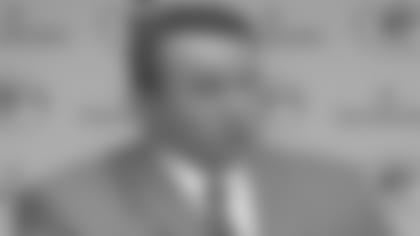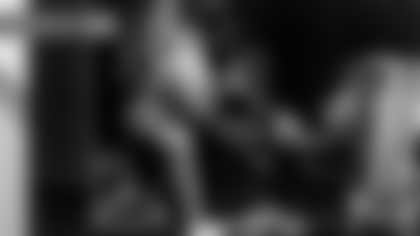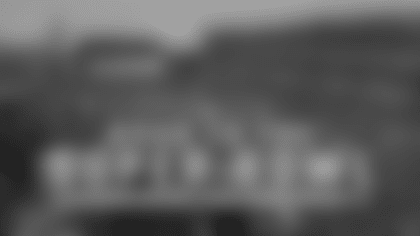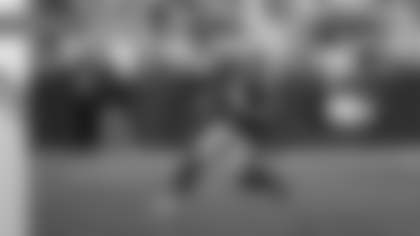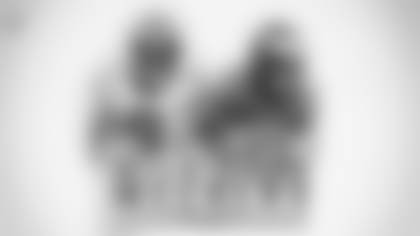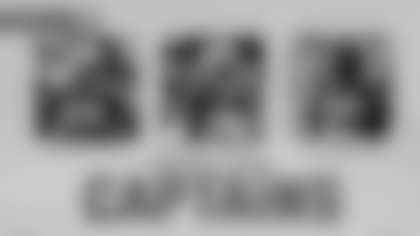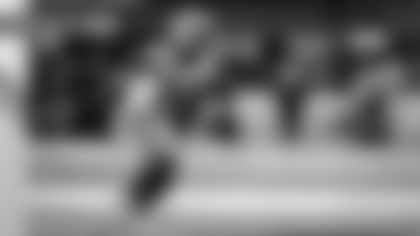OK, I'll start with the injury report first. Nick Collins had a hamstring, he'll be questionable this week against the Jets. David Martin still has the ribs. We're evaluation him and he'll be questionable. P.J. Pope has a hamstring. He's also questionable. Mark Tauscher, same with the groin, is doubtful. Ben Taylor with his hamstring is doubtful. Nick Barnett with the hand, questionable. Noah Herron, quad, is questionable. Greg Jennings with a knee is probable. Marquand Manuel with his quad is probable, and Scott Wells had an elbow and a hamstring and he is probable. And with that I'll take your questions.
(Are you still unclear what you're going to get out of your team each week? It seems like it's been quite a roller coaster.)
The roller coaster comes in my view in the wins and the losses. There's a number of things in last night's ballgame that we need to do better, fundamentally, technique, recognition, things like that. That's a weekly challenge, particularly with the experience level we have in some areas, and frankly that's what showed up in a big way last night against us.
(Is there a specific reason for the struggles in the running game the last few weeks? Is it missing Tauscher?)
Well number one, Mark Tauscher, he was a big part of what we were doing. I thought Mark was playing extremely well when he got hurt. For a couple weeks there he had the best performance up front, so you take that out of the equation, yeah, that part factors. And frankly his leadership, and the way he plays the game. He plays the game the right way. He's tough, no-nonsense, does it right. So that's a part of it. The last two weeks we had some matchup challenges and things like that, but disappointing last night. We weren't fundamentally sound on the front side at times. We weren't fundamentally sound from an execution standpoint on the backside. I thought Ahman ran the ball very hard. I thought the fullbacks were OK with their fits. We just were not in sync like we should have been. We had a number of good looks as far as the fronts we were getting. In hindsight, I really feel good about the plan and how we went about it, but our execution was not there last night.
(Can you describe Hodge's play?)
The defensive tape is actually the one I have not seen. I've watched the offense and special teams. Just in communication with Bob, and we'll watch that this evening, he felt he was solid. But our mistakes in the run defense were very similar to the mistakes we had in the run blocking unit on offense, starting with alignments. The alignment not being exactly the same set in the front a certain way a number of times, and then you get from that now to the fits are not as tight as they should have been, the gap expansion as far as the leverage was wider than it probably should have been. We had a number of those things, particularly involving our front seven, and he was a part of that.
(What do you mean by alignment? Are they just not lining up the way you want them to?)
Yeah, just as far as recognition, as far as what the offense is going to do, setting the front in accordance with the call. Just the little things. They may look minor to the normal person, but it does affect your fit and how you set the front and so forth.
(On special teams, is the lane integrity just breaking down?)
You talking about kickoff coverage? Yeah, lane integrity after the first one was very poor. When you kick it left, you leverage left, and when they bring it back right, you have to get off the spot, particularly when you're still 20 yards away from the ball, and you cross their face and play with leverage. It's something we've all been taught since day one, it's emphasized over and over again, and we had a number of breakdowns almost it seemed like on every return to that point. It was a poor performance in the kickoff coverage.
(Was the field goal a low kick?)
I think it was a combination of low and the penetration we had in the B gap to the right side. I thought it was lower in the game than when I saw it on film. But also our pad level was too high in the protection part of it.
(The two drives where you did not capitalize on turnovers in the first half, how big were those?)
That's part of the factor. When you have four turnovers like we did and you don't generate point production on two of them, that speaks volumes. We had the field goal block and the interception thrown down ... that clearly factors. We should at a minimum have six points out of that.
(Did you want to establish the run on both of those drives?)
I really just wanted to make sure we were staying in a 50-50 mindset, and the starting point is running the football. I think we established that with the first touchdown. I thought it was a very physical run, it was well-blocked, and I was hopeful we would continue on that path as we went forward, but we did not.
(On 3rd and goal at the 11, you chose to run the ball. Why not take a shot at the end zone there?)
Frankly, my initial thought was the weather. If you go back to Ahman even on the touchdown, the ball came out. Ball security was an issue, particularly early in that game. And after the false start, I had two calls, which I always do in a situation like that, and I was going to throw the screen or run the draw play, and frankly I just elected to stay in regular and run something clean. It was very similar to the play we scored on, and hey, quite frankly, if we get the back-side cut there, it has a chance to come out, because we had accounted for the front-side safety and did a very good job on the front side. I have no bones about it, I clearly played for the field goal there, just because I was concerned about the ball security at that point.
(Is play-calling a tough thing? It seems you took some heat a couple weeks ago for a pass play on first and goal.)
It depends on how you view it. If you sit there and look at the result, that's probably not accurate from my viewpoint. Pulse of the game, there's a number of factors there. Those are all calculated risks. Maybe a draw would have been a better run than the lead zone out of base. We got the coverage we thought, the over defense, we got the look and everything we anticipated. So that's really what you can ask for, and that's how I evaluate it. If I put them in a chance to be successful, as far as the defense and so forth, that's a proper call, when you're just calling run-it type plays. Then when you get into adjusted type plays, when there's a run and pass and things like that, then the play-caller and the quarterback need to be on the same page. So that's how I really evaluate play-calling.
{sportsad300}(Favre's interception in the first half - should that have been a throwaway?)
No, I'll tell you what, frankly in the game I thought it was a poor decision. But now that I've seen it on film - you're referring to the keep, right, the first one? - he came out, we had Donald on the over, the safety cut to the over, and frankly he just overthrows Bubba. If he puts that ball on him, he has a chance for a touchdown. It's something we anticipated. That's how they play their quarters coverage, they cut the over route a bunch, and it was pretty clean. Initially in the game I thought he was out so clean he should have stayed to the front side, and worked I think it was Greg he had on the comeback. But after I watched it on film, he had Bubba. He had him leveraged, and there was definitely a hole to throw through.
(Is there any way to recommend changes in the subjectivity on calls like the one on Jenkins?)
The way I view officiating, when you get in situations like that, as coaches you train your players to play a certain way, and as you go through every off-season, there are always emphases and things like that. When something like that happens in the game, what do you tell the player? When the player does exactly what he's told or taught to do and he's penalized, that's when it's tough. That's kind of the never-ending challenge between coaching, officiating and playing. I think with the system they have in place, there's a lot of communication. We have communication every week with the league office as far as our concerns going into the game, and then we'll send in a bunch of plays today as far as concerns we had from the game, and then they respond. So the communication part of it, everybody wants to get it right, but it's tough when things like that happen.
(Are you hoping for a clarification from the league on that?)
We'll get a clarification on the call, their opinion of what they thought and so forth.
(On the red zone play to Ruvell Martin, it looked like a hot read. What happened on that?)
It was a hot read, and Ruvell did not see the hot, and him and the quarterback were not on the same page. He just needs to look, as soon the guy blitzes. Everything we do in our offense, there's a lot of common threads. Without getting into specifics of our blitz adjustments and things like that, but that's a very basic component of how we handle pressure in certain pass protections.


